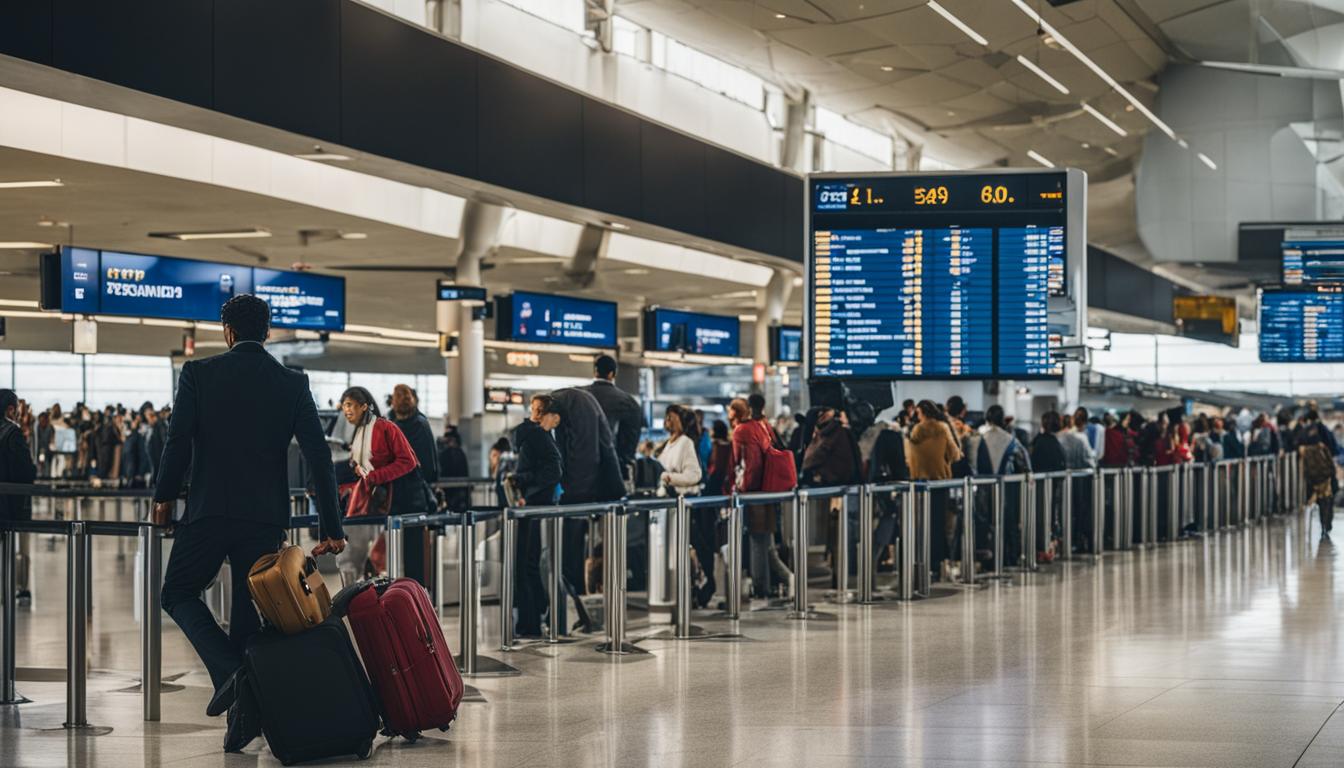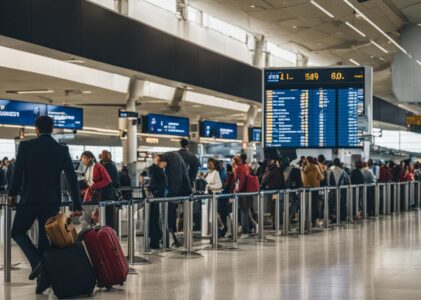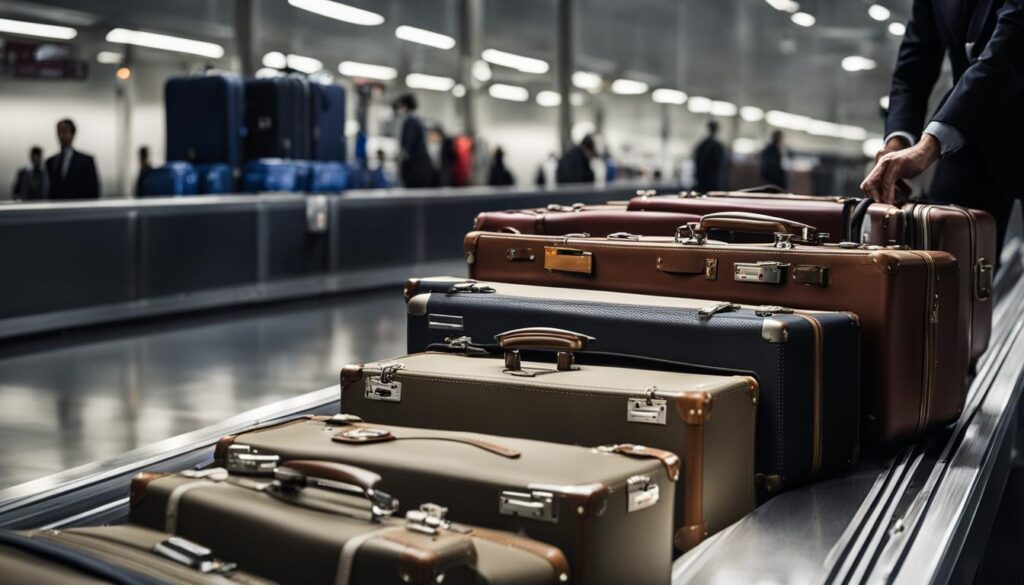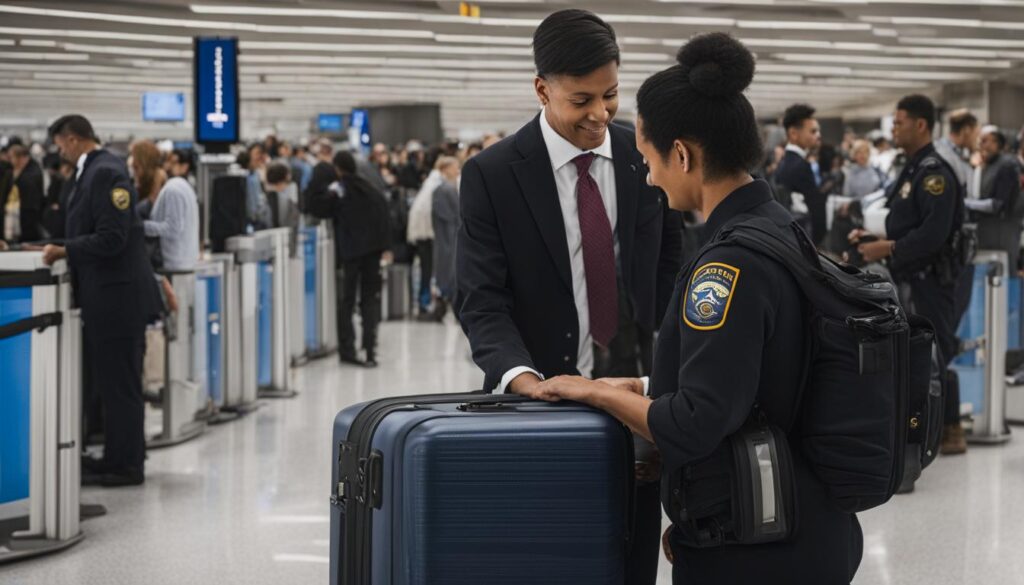Have you ever wondered if it’s possible to skip a flight segment on your itinerary? Maybe you’ve heard rumors or stories about people saving money by intentionally missing a connection or changing flights mid-trip. In this article, I’ll dive into the world of skipping second legs of flights, exploring why some travelers choose to do it, what happens to their ticket, how to minimize the risk, and the potential consequences you should be aware of.
Key Takeaways:
- Skipping a flight segment can be a way to modify your itinerary or save money, but it comes with risks and potential consequences.
- The most common reason for skipping second legs is throwaway ticketing, where travelers take advantage of pricing power and different market demands.
- Skipping a segment violates airline rules, and the rest of your itinerary may be canceled as a result.
- To minimize the risk, avoid checking bags and ensure compliance with travel requirements.
- Airlines can impose penalties for skipping flights, but proving intent can be challenging for them.
Reasons People Intentionally Skip Segments on Itineraries
The most common reason people skip segments on flight itineraries is a practice known as throwaway ticketing. Airlines often charge more for nonstop flights and flights to certain cities. By booking a longer itinerary and getting off the plane at a connecting city, travelers can save money. This takes advantage of the pricing power and different market demands that airlines have.
Another reason people skip segments is to take advantage of hidden city ticketing. This occurs when a traveler books a flight with a layover in their desired destination city, but the layover city is actually their final destination. By skipping the last leg of the flight, passengers can save money on fares. This practice relies on the fact that airlines sometimes price connecting flights cheaper than direct flights to the same final destination.
Some travelers also prefer nonstop flights over connecting flights due to convenience or time constraints. They may book a longer itinerary with a layover to secure a seat on a nonstop flight and then intentionally skip the connecting flight. This allows them to enjoy the benefits of a nonstop flight while paying a lower fare.
Throwaway ticketing and hidden city ticketing are practices that some travelers use to save money on airfare. By booking longer itineraries and skipping segments, passengers can take advantage of the pricing power and different market demands of airlines. However, it’s important to note that these practices violate airline rules and can lead to potential consequences.
| Reasons to Skip Segments on Itineraries | Examples |
|---|---|
| Throwaway Ticketing | Booking a longer itinerary and getting off at a connecting city to save money |
| Hidden City Ticketing | Booking a flight with a layover in the desired destination city and skipping the last leg of the journey to save money |
| Preference for Nonstop Flights | Booking a longer itinerary with a layover to secure a seat on a nonstop flight and then skipping the connecting flight |
While skipping segments can offer financial benefits, it’s important to be aware of the potential consequences. Airlines consider these practices a violation of their rules and contracts of carriage. The standard practice is that if a segment is skipped, the remainder of the itinerary is invalidated. This means that if a passenger decides to skip a segment, the entire itinerary may be canceled, and they may face additional penalties or charges. It’s essential to understand the risks involved and weigh them against the potential savings before deciding to skip a flight segment.
Violation of Airline Rules
Skipping a segment on a flight itinerary is a direct violation of airline rules and the contract of carriage. It is important to understand that when a segment is intentionally skipped, the remainder of the itinerary is typically invalidated. While there may be instances where boarding on subsequent flights is still possible, especially if they involve interline partners, it is generally understood that the entire itinerary will be canceled.
By skipping a flight segment, passengers are essentially disregarding the terms and conditions they agreed to when purchasing their ticket. The contract of carriage outlines the obligations and responsibilities of both the passenger and the airline. It serves as a legally binding agreement that passengers must adhere to throughout their journey.
Interline partners, airlines that have agreements to honor each other’s tickets, may offer some flexibility when it comes to skipped segments. However, it is essential to check the specific rules and policies of each airline involved in the itinerary to determine the potential consequences.
Table: Consequences of Skipping a Flight Segment
| Violation of Airline Rules | Contract of Carriage | Interline Partners |
|---|---|---|
| Invalidation of the remainder of the itinerary | Legal agreement between the passenger and the airline | Varying policies and consequences |
| Potential penalties and fare differences | Enforced by the airline | Possibility of boarding on subsequent flights |
| Operational issues and negative impact on other passengers | Disruption of airline operations | Limitations and restrictions |
It is crucial for passengers to understand the potential implications of skipping a flight segment before making any decisions. While it may seem like a way to save time or money, it can lead to various consequences that could impact future travel plans. Passengers should familiarize themselves with the specific rules and policies of the airlines involved and consider alternative options that align with the terms of their ticket.
Minimizing the Risk of Skipping a Flight on an Itinerary
When it comes to skipping a flight segment on an itinerary, there are a few strategies you can employ to minimize the risk involved. Whether you’re looking to save money or simply change your travel plans, taking precautions can help ensure a smoother journey.
Checked Bags
One important consideration is your checked bags. To avoid potential issues, it is advisable not to check your bags unless you have a long layover that allows for their retrieval. This way, you can avoid any complications that may arise if you decide to skip a connecting flight.
Long Layover
Another factor to take into account is the duration of your layover. If you have a long layover, it may provide you with more flexibility to explore the possibility of skipping a flight segment. However, be sure to carefully evaluate whether it aligns with your travel requirements and any visa restrictions for your intended destination.
Duplicate Bookings
To prevent confusion and potential problems, avoid making duplicate bookings on the same airline that depart around the same time. This can help ensure that your travel plans remain clear and avoid any mix-ups that could arise from overlapping itineraries.
By considering these factors and taking the necessary precautions, you can minimize the risk of skipping a flight on your itinerary. However, it’s important to note that intentionally skipping a segment is a violation of airline rules and can have consequences. Make sure to weigh the potential benefits against the possible risks.
Potential Consequences of Skipping a Flight on an Itinerary
Skiplagging, the practice of intentionally skipping a flight segment on an itinerary, can have potential consequences that travelers should be aware of. While it is not illegal, skiplagging violates airline contracts of carriage. As a result, airlines have the right to impose penalties and take legal action against passengers who engage in this practice.
One potential consequence of skiplagging is that airlines may charge fare differences if a passenger skips a segment. This means that travelers may end up paying more for their ticket or face other financial repercussions. Additionally, airlines can cancel the remaining legs of the itinerary, leaving passengers stranded or requiring them to rebook at a higher cost.
Although proving intent to exploit or circumvent fare and ticket rules can be challenging, airlines have taken passengers to court over skiplagging. While there have been instances where courts ruled in favor of passengers, it is important to note that intentionally leaving empty seats can create operational issues. This can disrupt airline schedules and negatively impact other passengers.
Passengers should weigh the potential consequences and ethical considerations before deciding to skip a flight segment. While it may be tempting to save money, it is important to consider the impact on airlines and fellow travelers. Travelers should also familiarize themselves with the specific policies of the airline they are flying with to fully understand the potential risks and consequences of skiplagging.
Personal Experience of Attempting to Skip a Flight Segment
During my recent travels, I decided to test out the practice of skipping a flight segment to save some money on my itinerary. Specifically, I attempted to skip a segment with United Airlines and encountered some unexpected challenges along the way.
My plan was to change my departure city to a different location, which allowed for a fare difference that worked in my favor. I thought I had found a clever way to maximize my travel budget. However, when I arrived at the gate, the vigilant gate agent quickly detected my attempt to skiplag and caught me in the act.
As a result, United Airlines canceled my entire itinerary, leaving me in a predicament. I had to scramble to find alternative options and ended up rebooking my flights at a higher cost than what I had originally anticipated. It was a lesson learned the hard way, and I realized that skiplagging is not a practice I will engage in again.
My experience with United Airlines serves as a cautionary tale for anyone considering skipping a flight segment on their itinerary. While the allure of saving money may be tempting, it is essential to understand the potential consequences. Airlines have strict policies in place, and attempting to exploit fare differences can result in canceled itineraries, unexpected expenses, and a significant disruption to your travel plans.
The Consequences of Skiplagging
Attempting to skip a flight segment goes against airline rules and can have serious repercussions. In my case, I not only had to pay a fare difference but also had to bear the inconvenience of rebooking my flights at a higher cost. This experience has made me realize the importance of adhering to airline policies and respecting the terms and conditions of my ticket.
While skiplagging may seem like a clever way to save money, it is crucial to consider the ethical implications and potential consequences. Airlines are becoming increasingly vigilant in monitoring bookings and uncovering skiplagging attempts. By engaging in this practice, you not only risk financial penalties but also run the risk of being banned or suspended from future flights with the airline.
It is essential to weigh the financial benefits against the risks and make an informed decision that aligns with both your budget and ethics. There are alternative ways to maximize your travel budget without resorting to skiplagging, such as booking well in advance, taking advantage of loyalty programs, or opting for refundable plans that allow for changes without penalties.
Lessons Learned from Attempting to Skip a Flight Segment
I recently had a personal experience attempting to skip a flight segment, and it taught me some valuable lessons. First and foremost, I learned that skiplagging, or intentionally missing connections, is not allowed by airlines. While it may seem like a clever way to save money on airfare, it is a practice that violates airline rules and can have consequences.
After attempting to change my departure city to save on a fare difference, I was caught by a gate agent. To my dismay, the airline canceled my entire itinerary and I had to rebook at a higher cost. It was a frustrating and costly lesson, but it made me realize that skiplagging is not a practice I will engage in again.
In the end, I canceled my travel plans altogether and received a flight voucher from the airline. It was a small consolation, but it reminded me of the importance of adhering to the rules and regulations set by airlines. While it may be tempting to try and outsmart the system, it’s not worth the risk.
Teen’s Experience with Skiplagging and American Airlines’ Response
During a recent trip, I decided to test out the practice of skiplagging, specifically hidden city ticketing. I had heard that it could potentially save me money on airfare, so I booked a flight with American Airlines, intending to skip the last leg of my journey. Little did I know that my experiment would lead to an unexpected encounter with the airline.
As I arrived at the airport for my connecting flight, I approached a gate agent to inquire about the possibility of skipping the final segment. To my surprise, the agent informed me that hidden city ticketing is a prohibited practice and not allowed. American Airlines emphasized that intentionally missing connections, like what I was attempting, could lead to operational issues. They explained that it can cause problems with checked bags and even prevent other customers from booking seats on the flight.
Reflecting on this experience, I now understand the potential consequences of skiplagging. While it may seem like a way to save money, it’s important to consider the impact it can have on airlines and fellow travelers. American Airlines’ response underscored the negative effects of intentionally leaving empty seats and disrupting their operations. It served as a reminder that skiplagging is a prohibited practice that should be avoided.
| Hidden City Ticketing | Prohibited Practice | Duplicate Booking | Operational Issues |
|---|---|---|---|
| Booking flights with layovers to save money | Airlines take action against passengers | Avoid making duplicate bookings on the same airline | Can cause problems with checked bags and disrupt operations |
This encounter with American Airlines has given me a deeper understanding of the hidden city ticketing practice and its implications. While it may be tempting to try and find ways to maximize our travel budgets, it’s essential to consider the ethical considerations and potential consequences. Skiplagging may not be illegal, but airlines can take action against passengers who engage in this prohibited practice. Ultimately, it’s important to weigh the financial benefits against the risks before attempting to skip a flight segment.

Disclaimer: The views and experiences shared in this section are based on personal accounts and may vary.
Legality and Consequences of Skiplagging
Skiplagging, a practice where passengers intentionally skip one or more flight segments on their round-trip tickets to save money, has gained attention in recent years. While it is not illegal, airlines have taken action against passengers who attempt to take advantage of this prohibited booking practice. Airlines’ contracts of carriage explicitly prohibit purchasing tickets with the intention of not flying all the legs in order to gain lower fares. If caught skiplagging, passengers may face serious consequences.
When a passenger skips a flight segment, airlines have the right to cancel future legs of the itinerary. This means that if a passenger misses an earlier flight intentionally, the airline may cancel their remaining flights. Furthermore, airlines can ban or suspend passengers from future flights as a consequence of skiplagging. It’s crucial to understand the potential risks and weigh them against the financial benefits before considering this practice.
| Consequences of Skiplagging | Legality of Skiplagging |
|---|---|
|
|
It’s worth noting that skiplagging does not work with round-trip tickets, as airlines will cancel the remaining legs if a passenger misses an earlier flight intentionally. Airlines also have the right to charge fare differences or pursue legal action against passengers who try to exploit this prohibited booking practice. While skiplagging may seem like a clever way to save money, it is essential to consider the potential consequences and adhere to the rules set by airlines.
Monitoring and Response by Airlines
When it comes to the practice of skipping flight segments, airlines are becoming more proactive in monitoring bookings and responding to potential violations. In particular, American Airlines has taken steps to identify instances of skiplagging or hidden city ticketing and to address this prohibited practice.
“We consider hidden city ticketing to be a fraudulent practice that misrepresents our products and services,” stated the airline representative. “By monitoring bookings, we aim to prevent passengers from fraudulently obtaining our content and taking advantage of pricing structures.”
This monitoring of bookings is part of a broader effort by airlines to maintain the integrity of their ticketing systems and prevent passengers from exploiting fare rules and discounts. By identifying instances of skiplagging, airlines can take appropriate action to protect their revenue and maintain fair pricing for all travelers.
While it is important for airlines to address prohibited practices, it is also crucial for passengers to be aware of the potential consequences. Engaging in skiplagging or hidden city ticketing can lead to penalties, such as fare differences or even suspension from future flights. It is therefore essential for travelers to understand the rules and regulations set forth by airlines and to respect them to avoid any unwanted complications.
Summary:
- Airlines, including American Airlines, are monitoring bookings to detect instances of skiplagging and hidden city ticketing.
- Monitoring bookings helps airlines prevent passengers from fraudulently obtaining content and misrepresenting their products and services.
- Airlines take action against passengers who engage in prohibited practices to protect revenue and maintain fair pricing.
- Passengers should be aware of the potential consequences, such as fare differences and future flight suspensions, and respect the rules set by airlines.
Skiplagged.com and Legal Challenges
Skiplagged.com is a website that caters to travelers seeking hidden flights that airlines may not openly advertise. It was founded by Aktarer Zaman in 2013 and has gained significant attention in the travel community. However, Skiplagged.com has faced legal disputes with major airlines, highlighting the controversial nature of this practice.
A notable legal battle was between United Airlines and Skiplagged.com. In 2014, United Airlines filed a lawsuit against the website, accusing it of promoting a prohibited booking practice known as hidden city ticketing. Hidden city ticketing involves booking a flight with a layover that is the traveler’s actual intended destination, rather than the final destination on the ticket. This allows passengers to save money by bypassing the higher fares associated with direct flights.
“The Chicago judge dismissed the lawsuit on the grounds that Skiplagged.com did not directly sell airline tickets and only provided information to users.”
The legal outcome of the United Airlines lawsuit brought attention to the limitations airlines face in curbing this practice. Skiplagged.com continues to operate, providing travelers with potential opportunities to find hidden flights. The platform plays a role in facilitating hidden city ticketing, despite the ongoing legal debates surrounding its operations.
It is important for travelers to be aware of the legal issues surrounding hidden city ticketing and the potential consequences of engaging in this practice. While Skiplagged.com may present opportunities to save money on flights, travelers should consider the ethical implications and potential risks before making use of this platform.

Conclusion
After exploring the practice of skipping flight segments, it is clear that it can be a tempting way to maximize your travel budget. By taking advantage of throwaway ticketing and hidden city ticketing, travelers can save money on fares. However, it is important to consider the ethical considerations and potential consequences of this practice.
While skipping flight segments may be legal in certain instances, it is important to acknowledge that it violates airline rules. Airlines have the right to impose penalties, such as charging fare differences or pursuing legal action, if they believe passengers are intentionally exploiting fare and ticket rules.
Furthermore, skipping flight segments can lead to operational issues for airlines, including problems with checked bags and empty seats. It is crucial to weigh the financial benefits against the risks before engaging in this practice.
Ultimately, the decision to skip flight segments rests with the individual traveler. It is important to be aware of the potential consequences and consider the ethical implications before making a choice.
FAQ
Why do people skip segments on flight itineraries?
People skip segments to take advantage of pricing differences between nonstop flights and flights with layovers. This practice is called throwaway ticketing or hidden city ticketing.
Does skipping a flight segment violate airline rules?
Yes, skipping a flight segment violates the airline’s contract of carriage. It can result in the cancellation of the entire itinerary.
How can I minimize the risk of skipping a flight on an itinerary?
To minimize the risk, avoid checking bags unless you have a long layover to retrieve them. Make sure to comply with the travel requirements of your intended destination, even if you’re not planning to fly there. Avoid making duplicate bookings on the same airline around the same time to prevent confusion.
Is skipping a flight on an itinerary illegal?
Skipping a flight is not illegal, but it does violate airline contracts of carriage. Airlines can impose penalties, such as charging fare differences or pursuing legal action.
What happens if I try to skip a flight segment and get caught?
If you get caught, the airline may cancel your entire itinerary and require you to rebook at a higher cost. They have the right to take action against passengers who try to take advantage of the practice.
Can I be banned from future flights for skiplagging?
Yes, if airlines catch you skiplagging or engaging in hidden city ticketing, they can ban or suspend you from future flights.
Are there any websites that help with skiplagging?
Skiplagged.com is a website that claims to find hidden flights that airlines may not want passengers to see. However, airlines have filed legal suits against it in the past.
Should I consider skipping flight segments to save money?
Skipping flight segments may save you money, but it’s important to consider the ethical implications and potential consequences. It violates airline rules and can lead to operational issues.




